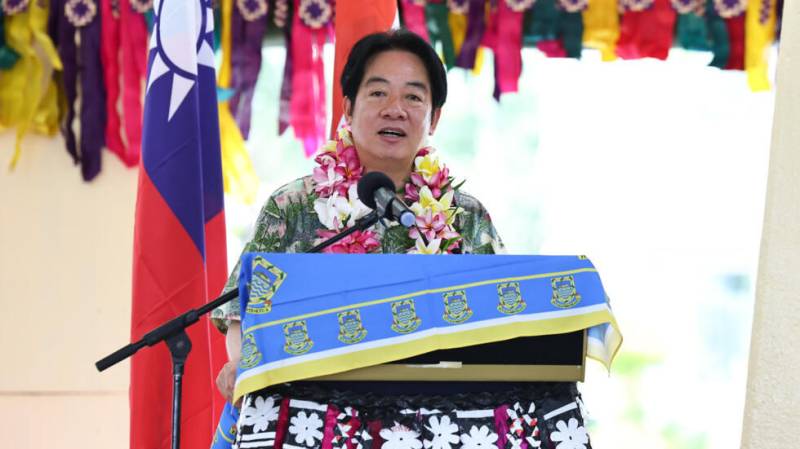Taiwanese president Lai reaches Guam during strategic Pacific trip

Stay tuned with 24 News HD Android App

Taiwan President Lai Ching-te arrived in the US territory of Guam on Wednesday, the second stop on American soil during a weeklong Pacific tour that has sparked fiery rhetoric from Beijing.
Taiwan calls itself a sovereign nation, but Beijing insists the democratic island of 23 million people is part of its territory and opposes any official exchanges with it.
Lai landed in Guam following visits to Pacific island nations Tuvalu and the Marshall Islands, after a stop in the US state of Hawaii.
His first overseas trip since taking office in May is aimed at shoring up international support for Taiwan as China seeks to poach its few remaining allies.
Tuvalu and the Marshall Islands are among 12 nations that still recognise Taiwan diplomatically, after China convinced others to dump Taipei in favour of Beijing.
Earlier Wednesday, Lai smiled and waved as he stepped off the plane in Tuvalu, where he was greeted by Prime Minister Feleti Teo, Governor General Tofiga Vaevalu Falani, schoolchildren, an honour guard and a traditional song and dance performance.
"When I disembarked and saw Tuvaluan students waving the national flags of our two countries, I strongly felt the people's firm commitment to our diplomatic alliance," Lai said through a translator.
Looking relaxed in a colourful shirt and a garland of pink and yellow flowers around his neck, Lai said he hoped Taiwan and Tuvalu can "expand our cooperation to even more areas, thereby further strengthening our diplomatic partnership."
Taiwan has a long history of providing development aid in the Pacific.
In a speech, Teo expressed "Tuvalu's thanks for Taiwan's contribution" to a pool of funds used by the government to buy a submarine internet cable, as well as its financial support for climate action.
In a joint communique on "advancing the comprehensive partnership" signed during Lai's visit, Taiwan and Tuvalu agreed to "reassess the ongoing bilateral cooperation projects, in order to establish a more durable, lasting and mutually beneficial diplomatic relations."
Teo was named prime minister in February, a month after an election that put the nation's recognition of Taiwan in question.
During the election campaign, senior lawmaker Seve Paeniu had floated the idea that Tuvalu's new government could review its Taiwan ties.
That set off frenzied speculation about a looming shift in policy, but the new government has vowed to keep up its "special" relationship with Taiwan.
- China fumes -
China has dramatically ramped up its efforts to gain influence across the Pacific islands in recent years, lavishing small nation states with loans, investment, security aid and other enticements.
Beijing has already poached some of Taiwan's Pacific allies, convincing Solomon Islands and Kiribati to switch recognition in 2019.
Neighbouring Nauru severed diplomatic ties with Taiwan in January this year, just days after Lai won Taiwan's presidential elections.
During Lai's visit to the Marshall Islands on Tuesday, President Hilda Heine expressed her government's commitment to "remain a staunch ally" of Taiwan.
Lai's trip began with a two-day visit to the United States, where he discussed "China's military threats" towards Taiwan during a call with former US House speaker Nancy Pelosi.
He also met with US government officials and members of Congress -- drawing a fresh barrage of criticism from Beijing.
China rejects any international recognition of Taiwan and especially bristles at official contact between the island and Washington, Taiwan's most important security backer.
China on Tuesday vowed to defend its "national sovereignty" and "territorial integrity" as Lai visited the Marshall Islands.
"The Taiwan issue is the core of China's core interests," foreign ministry spokesman Lin Jian said, when asked whether Beijing could launch another round of war games around the self-ruled island in response to the Pacific tour.
Taiwan's top China policy body, the Mainland Affairs Council, on Wednesday accused China of "using military hegemony to threaten Taiwan".
"Such actions will only push cross-strait relations further apart and offer no benefit to the future interactions between the two sides," MAC Minister Chiu Chui-cheng told reporters.
Lai will wrap up his trip on Friday with a visit to ally Palau.
